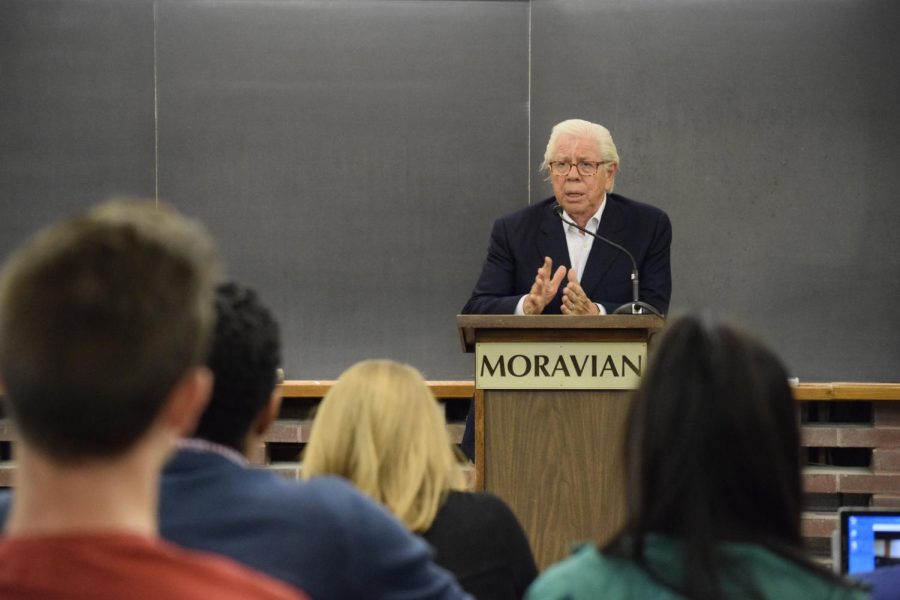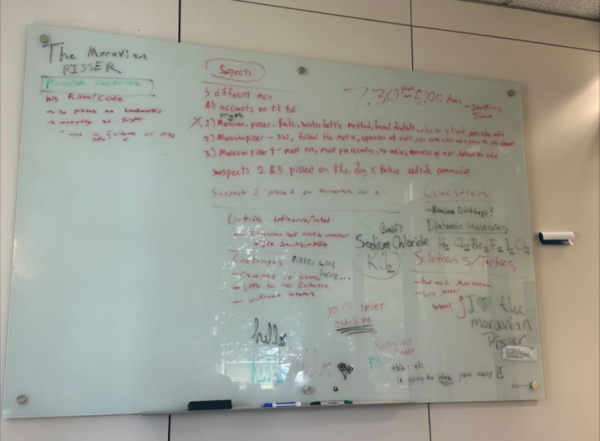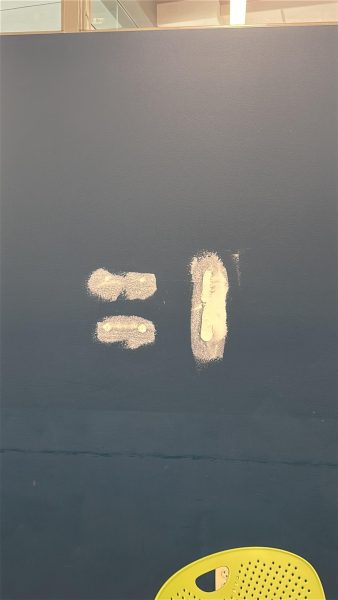6 Questions for Journalist Carl Bernstein
Moravian College welcomed renowned journalist Carl Bernstein to Johnston Hall on Tuesday, Oct. 24. Bernstein discussed the current role of the press and declared that America is in a state of a “cold civil war.” Following his presentation, The Comenian spoke with Bernstein to get his opinion on heated topics and trends. Below is an edited transcription of the interview, along with his responses to inquiries during the question and answer section of the presentation.
Do you think the influence of social media is good for journalism, or do you believe that it perpetuates the biased approach to the consumption of news?
I wouldn’t generalize about it. I think that social media can be a very useful tool for the dissemination of information. I think it can be also very destructive. There’s a much more diverse media environment than in the era that I grew up in, when we had three television networks. Every big city with over 20,000 people had a newspaper, most cities over 100,000 to 200,000 had two newspapers. We have lost a kind of communal aspect [which grew from sharing common news].
Social media has none of the vetting of information that you would have in an institution like The New York Times, The Washington Post, The Philadelphia Inquirer. Some news organizations, some sites, use social media [and] have some standards on the best obtainable version of the truth, but not many I would say.
Another thing that has been lost with the death of newspapers is the pleasure that comes from reading. I find that I read a good number of websites each day and I go back to the same ones throughout the day, but I never really get to read the whole thing. I never really ever get to read the whole New York Times and the Washington Post. I’m always picking. At the same time, the web in many ways is a much better platform for news; it’s infinite–you can run all the graphics you want, all stories can go as long as you want, you can link to another story, you can link to another publication. It’s fabulous, and at the same time it can be overwhelming.
What parallels do you see between the Trump and Nixon administrations?
Nixon’s lying was much more situational, having to do with covering up a criminal presidency and aspects of it. [It was] a criminal presidency from its beginning to its end in terms of abuse of power, in terms of a vast campaign known to the president of the United States, of political espionage and sabotage aimed at undermining the democratic system of the United States.
Nixon’s lying was really about trying to avoid being caught at what he had done. Trump’s lying would seem, on the basis of our reporting, to extend to the mundane to the quotidian, to matters great and small, that there seems to be no baseline, no default almost ever of Trump’s truth on matters that he believes are consequence to him.
What do you think the future of journalism looks like?
I’m never good at predicting that stuff. I think that journalists do pretty good when they stick to what they know [than] when they try to work with a crystal ball; I think they’re out of their league. There’s just no way of knowing.
Do you think journalists today still have the power to take down a president?
I think it would be a big mistake to think that journalists took down [President Nixon]. It didn’t happen. The system, if you read All the President’s Men, if you read the history of Watergate, you learn that there are many elements of the system that can replace the press, the judiciary, the Congress, the people of the country. So it’s a real mistake to think that the journalists brought down the president of the United States. It did not happen.
You said tonight that we should institute compulsory national service. Why?
I think there ought to be compulsory national service for young people for a year or year and a half at the age of 18, in which they serve [the country, by] teaching, [working] in hospitals, doing forestry work. [There should] just [be] a commitment to the community, the military, whatever it is. They would learn to work together with other young people who come from different backgrounds. I think [the experience] would be transformative.
How can young journalists prepare for the future?
Read a lot, and not just journalism. The way I talked earlier about [reading] news sources I think is essential, but also becoming literate in terms of knowing great works, of reading widely in the old liberal arts sense, in the sense of history.[Another] essential element that I think is really necessary to be a good journalist is to be a good listener, something that many journalists are not.
We [also] need to respect the people we cover, we need to understand that most of them are probably trying to tell us the truth as they see it. And often we don’t give them a chance because we’ve got a preconceived notion of what the story might be, or we see our role as combatants, or we’re interested in ginning up controversy. I know of no major story I’ve ever worked on as a journalist that turned out the way I thought when I started.







